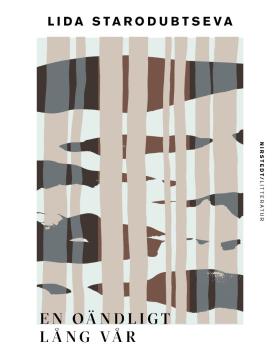
En oändligt lång vår
(An Endlessly Long Spring)
by Lida Starodubtseva
reviewed by Kathy Saranpa
Lida Starodubtseva has worked for many years translating Swedish literature into Russian, but knew that she had her own stories to tell. This startling debut is the introduction to what will certainly be a major literary career. Starodubtseva, who began learning Swedish at the age of 16 and moved to Sweden in her late 20s, masters her adopted idiom astonishingly well, and her musical ear and deft sense of diction provide her prose with a depth and resonance that capture the reader’s attention across a broad canvas of images and moods.
Because this is not easy reading. The going is slow and deliberate, with pauses to take in uncertainties. Part of the difficulty lies in the constant motion of the characters, many of whom are not rooted in one place, or only temporarily. Part of it is the impressionistic way in which images, figures, and places recur and reconstitute, kaleidoscope-like – are we seeing the same woman at a younger age? Is this the one who married the abusive foreigner? The reader who looks for fixed geographic points will find few (although the town of Petrozavodsk is identifiable in the first story), although the characters travel in almost every section, by plane and ferry, by fast car, by taxi.
What the nine stories in the cycle – the genre the collection resembles the most – have in common are a setting in northern Europe and Karelia, women who are in flux emotionally and in terms of their relationships, and situations of perceived or real danger. Traumas are never articulated directly, but the mood is palpable. There’s the young girl whose drunken father tries to get his daughter to unlock the door to her apartment, a girl who could instead take refuge with a neighbour woman, but whose husband may not be safe, either. There’s the pregnant woman whose husband will probably only become more and more oppressive after the child arrives. And there’s the friend (lover?) of a violent but charming folk musician, brought to see the man in a mental institution by someone who is in all likelihood a KGB agent.
This musician is worth a second look, because he appears in one of the most complex and evocative moments of the book. As Teo Malets (whose name is later explained as an ethnic disappointment) enters the visitor’s room, he speaks a line from a song which he believes was composed by Bob Dylan, and does so ostensibly because it helps him to dispel the air of vulnerability he has, a mental institution patient with a swollen lip and missing teeth: ‘You can’t hold the hand of a rock-n-roll man very long’. However, as the narrator comments, this quote is from Joni Mitchell, and it’s a line soaked in irony – not to mention spoken from a woman’s perspective. She cannot meet his eyes after hearing him drawl the line, looking at a door instead – wanting to escape his embarrassment? At many points in these stories, a seemingly casual glance or comment reveals a much larger view.
While the underlying feeling of peril or rootlessness is constant, there are moments of humour, delight and beauty as well. In the story ‘Leka tre’ (Play three), a young girl plays with an imaginary companion, Malgorzata, who appears in the picture on a cheese package. Their laughter and games dispel the loneliness otherwise apparent in the girl’s life. The conversations a (another?) girl has in ‘Att släppa en liten fågel fri’ (Letting a little bird go) sound at times like a comedy routine, made funnier by the idea that a bird could talk back to a human. Maternal tenderness, even in poverty and worry, is a constant theme running through almost all stories, even in ‘Min mormor är utomjording’ (My grandmother is an extraterrestrial) where love is shown through remonstrances.
Starodubtseva was nominated for Borås Tidning’s prize for debut writers in 2024 as well as the Swedish Writers’ Union debut prize, Katapultpriset, and she is working on her next book. Her grandmother emigrated from Finland to Soviet Karelia in the 1930s and appears in An Endlessly Long Spring; perhaps her story will take up more room in Starodubtseva’s upcoming work.

En oändligt lång vår
Nirstedt, 2023, 271 pages
Foreign rights: Emiliano Seren, Modernista
An excerpt from En oändligt lång vår also appears in SBR 2025:1.
Lida Starodubtseva is a writer and literary translator working between Russian and Swedish. En oändligt lång vår is her literary debut. It was nominated for both of Sweden's major prizes for debutants in 2024, Katapultpriset and Borås Tidnings Debutantpris.
